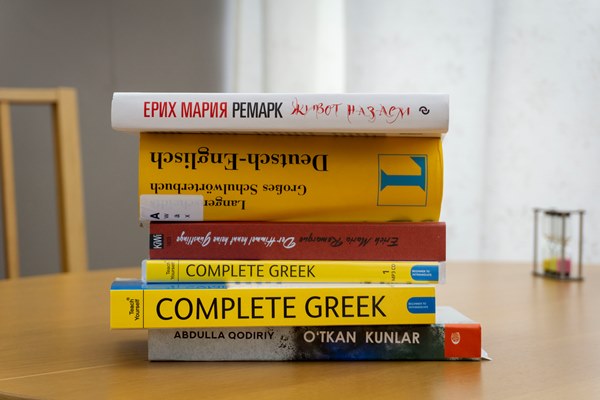It’s usually recommended to focus on one language at a time, become fluent in it and only then start learning another one. However, language acquisition is a continuum, and some of us need to study languages for work or travel. Others are impatient. And yet others are passionate about languages and the process of learning by itself excites them. In short, it’s possible and sometimes beneficial to learn more than one language at a time, and I will share how I do it. Please take a look at the other articles in my language learning series, and share your experiences with me.

A few caveats, however. First, if you’re studying your first foreign language, then taking up two at the same time will not work. It will be too overwhelming. Second, if the languages you’re learning are too similar, you might consider learning one until you reach an intermediate level and only then start the other one. Third, if you can’t devote the time, it’s best to limit your ambitions. If you need at least 10 hours of practice a week to progress, then you’d require twice as much to learn two languages.
Imagine that you would like to focus on learning Spanish and Russian. Your Spanish is at a lower intermediate level, while you’re a total beginner in Russian.
You Can Prioritize One Language
You can prioritize one of the languages and devote more hours to it. Which language it might be depends not on your fluency, but on your interest in learning the language. I find that what motivates me the most is curiosity and passion, not practical considerations.
Prioritize one of the languages, but use the other one as much as possible; even watching a video or listening to a song in that language once a day is better than doing nothing at all.
Or you can switch. Prioritize learning Spanish during the first few months, while learning Russian and then plan more studying in Russian, while reducing the number of hours in Spanish. As long as you continue to use the language in one form or another, you won’t forget it.
Speak From Day One
Find a native speaker and schedule lessons in both languages. I rely Skype lessons via Italki and mylanguageexchange* and try to schedule 2 classes a week in both languages. Ideally, you would have 2 classes in Spanish and 2 in Russian. Spend the lessons with your tutor talking. You can do grammar exercises, vocabulary drills, or reading on your own, and at most, you’d spend 10-15 minutes checking your homework or covering new grammar concepts. Instead, urge your tutor to help you speak. Learn the vocabulary as needed to ask them basic questions and to follow their responses. Learning grammatical concepts in the context of a natural conversation.
For instance, you decide to prioritize your Spanish and start learning Russian. Have two classes a week in Spanish and one class in Russian. In your non-classroom time find as many ways to enjoy the languages as possible–look for films, music, books, go shopping at a Russian store, send your Spanish tutor an email in Spanish, write a comment on a Spanish language blog.
*Both Italki and My Language Exchange offer a chance to find language exchange partners, and I highly recommend trying it. First of all, your language learning will be at no charge (the cost being your time, of course), and by teaching another person your native language, you’ll understand better the process of acquiring a new one.
Building Vocabulary During the First Month
During the first month, I don’t do any grammar drills*, apart from the most basic things needed to build simple sentences. So no endless verb conjugations and studying cases. That’s important, but not at the initial stage. Learn words and phrases to talk to humans. Study them, write them out if it helps, try to recall them at random moments throughout the day–“so, how do I say ‘how is it going?’ in Russian?” “If I had to describe the book I just read in Spanish, how would I do it?”
If you’re learning a language with a new alphabet, learn the alphabet right away and spend your time alone practicing it. For this reason, don’t pick two languages with two different (and new to you) alphabets.
*This comment of mine is always met with incredulity, because conventional schooling is based on grammar drills. So let me clarify—grammar is essential, but grammar exercises aren’t useful during the first month when you should be learning phrases, practicing speaking and work on your pronunciation.
Vocabulary and Grammar after the First Month
Once you have the basic vocabulary in both languages and feel comfortable with it, you can do as many grammar drills as you can take. You’ll know why you’re doing them and in what contexts they would be useful.
Keep your word lists in both languages around you all the time—in the Anki app, flash cards, printouts or your phone.
Practice Switching Between Languages
Many studies show that most of the benefits from learning another language come from switching between them. It trains your brain to be plastic and to adapt to new stimulation. Although at first it might be hard to reset your thought process between two different languages, it’s rewarding. In real life you often have to think on the spot, so you might as well train yourself to respond quickly.
This practice also will ensure that you learn not to mix languages. At first, mixing will be inevitable, but it will soon go away.
I usually study in the morning. If I were learning Spanish and Russian, I would first review my new Russian vocabulary and do a few exercises from a workbook. Then I would review my vocabulary list in Spanish and read a book (writing down any unfamiliar words and looking them up in the dictionary). Whatever language I study, I vary the process a bit to keep things interesting, but I always start by reviewing lists of words and phrases that I make after every class.

Do a Little in Each Language Every Day
The feast or famine approach to studying a language is futile. You should expose yourself to the language you’re studying every day in some form or another. I talked more about it in my first article in this series. Do whatever you normally do, but in the language you’re learning. Make learning the language a natural process.
Take every opportunity to practice the language. With your tutor in particular you shouldn’t use English at all. Even if they switch to English to help you out, condition yourself not to do it. The easy shortcuts delay your learning.
Slow vs Intensive
At this point of my language learning, I prefer the steady and slow method to the intensive ones. The languages I learned via intensive immersion programs have all vanished (or else I had to relearn them), while the ones I studied at a more steady pace took strong root. So, whether you are learning one language or two, be sure to have a chance to weave both of them into the fabric of your routine. Review words and phrases on regular basis. If you meet someone who speaks the languages you’re learning, strike a conversation with them without resorting to English. Think of learning languages as a lifestyle rather than a one time pursuit.
Don’t Give Up and Reward Yourself for Your Hard Work
Learning languages is satisfying in many ways, but it can also be discouraging when you make mistakes or forget the same words over and over again. With two languages your workload is heavier, but don’t let that discourage you. Congratulate yourself for learning something new. Use your mistakes to motivate you to study more. Use them to learn something about yourself. Or forget about them and just talk.
Reward yourself for your efforts in creative ways. If you decide that every week you’ll write two paragraphs in Russian or read 5 pages of Cervantes and you do it for a month, treat yourself to something special. Celebrate your accomplishments, however small, and take pleasure in your studying.
Studying more than one language at the same time is possible. It trains you to be a quick thinker. It teaches you to recognize patterns, the essential part of learning. It can help you see connections among languages. As a speaker of Persian, I’m delighted to find Persian words in languages in completely different families like Malaysian, Bulgarian or Albanian. Learning languages also teaches you humility, inspires your creativity and stimulates your curiosity. So, go ahead and take the plunge.
Above all, learning a language opens up your horizons and gives you a chance to connect to people in a much more profound and meaningful way. These days it’s more important than ever.
If you have any questions, I’m always happy to answer them.
Photography by Bois de Jasmin













15 Comments
Joe: Thank you for your articles on learning languages. Please keep on writing them. I like your tips and my progress in German is already obvious to my teacher. “Doing even a little every day” is my goal. April 13, 2020 at 9:03am
Victoria: I’m so glad to hear it! Good luck with your studies. April 14, 2020 at 8:20am
OnWingsofSaffron: Viel Glück und beste Grüße aus Deutschland! April 14, 2020 at 11:26am
Armando: Thank you for your articule! I find it very useful. I already speak Spanish and English, and some Hebrew, but I want to be fluent in it so I need to practice more often. Daily prayers help but the alephbet is what is keeping me from advancing!.
Also, I am learning German, which came somewhat easier thanks to my prior knowledge of English. April 13, 2020 at 11:16am
Victoria: Good luck, Armando! I’m sure that you’ll get there. For the languages in different alphabets (different from your native one), you need to put in more work, but the challenge itself is rewarding. April 14, 2020 at 8:19am
OnWingsofSaffron: Auch dir, Armando, alles Gute beim Deutschlernen! April 14, 2020 at 11:29am
Lauren: Thanks for continuing this series. Learning languages was my first love, even before perfume. It’s also wonderful to read fragrance reviews and recipes in your chosen languages. Have a beautiful week! April 13, 2020 at 2:00pm
Victoria: It’s same for me! I’ve always enjoyed learning languages. April 14, 2020 at 8:17am
Karen A: Perfect timing! I had to take a break from Latin while also learning Turkish on Skype as right now I’m just not able to add one new thing to my brain. But I was thinking it would be fun to start some French lessons as I studied it for quite a while years ago and started back up briefly last year, but still remember lots. April 13, 2020 at 2:40pm
Victoria: You can at least do some practice or watch movies. Anything to expose yourself to the language once again. April 14, 2020 at 8:17am
Megan: I’ve been having good luck with Pimsleur Mandarin so far. It helps to have lessons based on speaking a language where pronunciation & tones are so important, and I like that the lessons are 30 minutes – I can fit that in every day pretty well. I have heard great things about Italki, too – that’s the next I want to try. April 13, 2020 at 9:22pm
Victoria: I agree, the method itself matters less than the motivation to maintain a regular studying schedule. I also hear good things about Pimsleur for the structure of their lessons, but I haven’t yet tried it. April 14, 2020 at 8:16am
Fazal: If you don’t mind me asking, how many languages your husband speaks? I am just curious whether your passion for languages has rubbed off on him in some ways 😀 April 14, 2020 at 6:35am
Victoria: He has his own passions, languages are not one of them. April 14, 2020 at 8:12am
Translator: For me personally, the most effective way to learn foreign languages is to study using books, and communicate online via Skype with native speakers. You make great content for people who want to learn foreign languages! June 25, 2020 at 8:42am